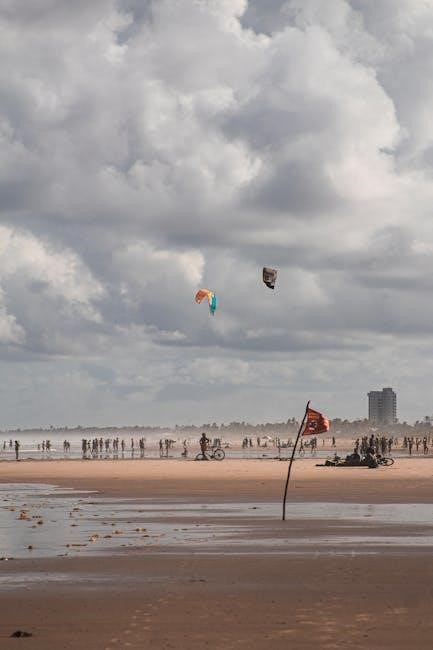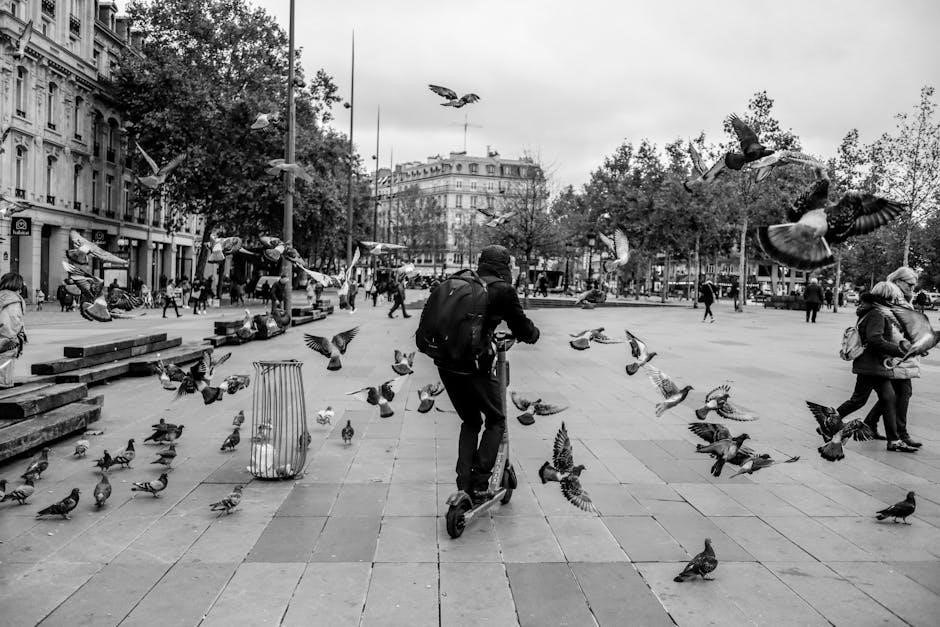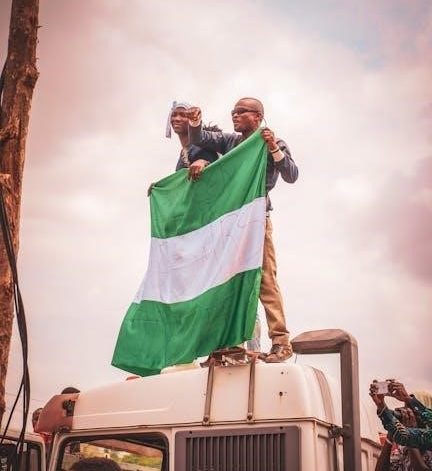The People Could Fly is a captivating African American folktale retold by Virginia Hamilton, exploring themes of freedom, resilience, and cultural identity. Originating from African folklore, it recounts the magical ability of flight among enslaved people, lost during the transatlantic slave trade, symbolizing hope and liberation.
Background Information
The People Could Fly is a powerful African American folktale rooted in the rich cultural heritage of African traditions and the harrowing experiences of the transatlantic slave trade. The story, retold by Virginia Hamilton in her 1985 collection American Black Folktales, captures the essence of resilience and hope amidst oppression. It describes a time when certain individuals in Africa possessed the magical ability to fly, a gift that symbolized freedom and joy. However, this gift was lost when these people were forcibly captured and enslaved, unable to carry their wings across the ocean. The tale reflects the profound sorrow of slavery while offering a message of enduring spirit and the longing for liberation. Passed down through generations, it serves as a testament to the strength of African cultural identity and the unyielding desire for freedom. The story remains a cherished part of African American folklore, inspiring readers to reflect on history, identity, and the transformative power of hope.
The Title’s Significance
The title The People Could Fly carries profound meaning, symbolizing freedom, empowerment, and the enduring spirit of African heritage. It reflects the magical ability of flight, a metaphor for liberation and the desire to transcend oppression. Rooted in African folklore, the title highlights the loss of this power during the transatlantic slave trade, emphasizing the historical and emotional impact of enslavement. Virginia Hamilton’s use of this title in her collection of African American folktales underscores the resilience of enslaved people, who held onto their cultural identity and hope despite immense suffering. The title also evokes a sense of nostalgia for a time when freedom was possible, contrasting with the harsh realities of slavery. It serves as a reminder of the strength and creativity of African communities, preserving their legacy for future generations. Through its imagery, the title invites readers to reflect on themes of freedom, loss, and cultural preservation, making it a powerful and enduring symbol in African American literature.
Origins of the Story
The People Could Fly traces its roots to African folklore, where people possessed magical abilities, including flight. The story migrated to America through enslaved Africans, blending with their experiences and becoming a symbol of liberation and resilience.
African Roots
The story of The People Could Fly deeply connects to African folklore, where certain individuals were believed to possess magical abilities, such as flight. These tales were rooted in the cultural and spiritual practices of African communities, often symbolizing freedom, strength, and divine connection. In Africa, flight was not just a physical act but a metaphor for spiritual transcendence and communal unity. The ability to fly was often associated with leaders, healers, and those with deep spiritual insight. These stories were passed down through generations, serving as a source of inspiration and hope. When Africans were forcibly brought to the Americas during the transatlantic slave trade, they carried these stories with them, adapting them to their new and harsh reality. The memory of flight became a symbol of the freedom they had lost and the resilience they needed to survive.
Passing Down the Legend
The story of The People Could Fly was preserved and shared through oral tradition, a vital aspect of African and African American culture. Enslaved individuals used folklore to communicate hope, resilience, and the longing for freedom. The tale of flight served as both a literal and metaphorical escape from the brutalities of slavery. Elders and storytellers passed down the legend, ensuring its survival across generations. After emancipation, the story continued to inspire, becoming a symbol of the enduring spirit of African Americans. Virginia Hamilton’s retelling in The People Could Fly: American Black Folktales brought this powerful narrative to a wider audience, maintaining its cultural significance. The story remains a testament to the strength of African heritage and the importance of preserving history through shared stories. Today, it continues to resonate, offering lessons on freedom, hope, and the unbroken ties to one’s roots.

Themes of the Book
The People Could Fly explores themes of freedom, liberation, and resilience, highlighting the emotional and cultural struggles of enslaved individuals. It underscores the power of hope and the enduring strength of African heritage in the face of oppression.
Freedom and Liberation
Freedom and Liberation are central themes in The People Could Fly, as the story symbolizes the longing for escape from oppression. The magical ability to fly represents a profound desire for liberation, allowing individuals to transcend the harsh realities of slavery. Flight serves as both a literal and metaphorical means of breaking free from physical and emotional shackles. The enslaved people, faced with unbearable conditions, turn to their ancestral magic as a source of hope and empowerment. This theme resonates deeply, as it reflects the resilience and determination of those who sought freedom, both in the past and present. Through the lens of folklore, Hamilton illustrates the enduring human spirit’s quest for liberation, making The People Could Fly a powerful symbol of resistance and the unyielding pursuit of freedom.
Loss and Resilience
Loss and Resilience are deeply intertwined in The People Could Fly, as the story reflects the profound sacrifices and enduring strength of enslaved individuals. The magical ability to fly, once a symbol of freedom, was lost when the people were forced into slavery. The shedding of their wings represents the stripping away of their cultural identity and autonomy. Despite this, the story emphasizes resilience, as the people retained their magical knowledge and passed it down through generations. Their ability to adapt and preserve their heritage, even in the face of immense suffering, highlights the strength of their spirit. The folktale serves as a testament to the human capacity to endure loss while holding onto hope and cultural identity. This duality of loss and resilience underscores the emotional depth of the narrative, making it a powerful exploration of survival and the enduring legacy of African traditions.
Cultural Identity
Cultural Identity is a central theme in The People Could Fly, as the story celebrates the rich heritage of African traditions and the resilience of enslaved individuals. The magical ability to fly symbolizes the deep connection to their African roots, where such powers were a natural part of life. The folktale highlights how cultural identity was both a source of strength and a target of oppression during the transatlantic slave trade. The loss of flight represents the erasure of cultural practices and the forced assimilation imposed by slavery. Yet, the story also emphasizes the preservation of cultural memory, as the knowledge of flight was passed down through generations. This serves as a testament to the enduring legacy of African traditions and the importance of reclaiming one’s heritage. By weaving fantasy and history, The People Could Fly becomes a powerful celebration of African American identity, bridging the past and present. It reminds readers of the significance of cultural roots in shaping who we are.

Key Characters
The People with the Gift of Flight
These individuals possessed the magical ability to fly, symbolizing freedom and resilience. Their wings, described as black and shiny, represented a connection to their African heritage and the power to escape oppression.
Leaders and Guardians of the Magic
Enslaved leaders and elders played a crucial role in preserving the knowledge of flight. They served as guardians, ensuring the magic was not forgotten, even as the ability itself was lost during the transatlantic slave trade.

In the tale, the people with the gift of flight were a select group from African communities who possessed a magical ability passed down through generations. Their wings, described as black and shiny, symbolized freedom, power, and a deep connection to their heritage. These individuals could soar above fields and villages, embodying the spirit of liberation and joy. When enslaved, they were forced to shed their wings, unable to carry them across the water on crowded slave ships. Despite this loss, the memory of their gift endured, becoming a symbol of resilience and hope. The story highlights their strength in preserving their cultural identity and the magic that lived on in their hearts, even as their physical ability to fly was lost. This gift remains a testament to their enduring spirit and the legacy of their ancestors.
The leaders and guardians of the magic in The People Could Fly were revered figures in their communities, tasked with preserving and passing down the ancient gift of flight. These individuals were often elder sages, spiritual leaders, or chosen ones who possessed deep wisdom and a connection to their ancestors. They were responsible for teaching the younger generations how to harness their magical abilities and respect the power of flight. The guardians ensured that the magic was used for the good of the community, fostering unity and strength. They also led rituals and ceremonies to honor the ancestors, who were believed to grant the gift of flight. During the era of slavery, these leaders played a crucial role in helping their people resist oppression and hold onto their cultural identity. Their wisdom and courage inspired hope, even in the face of immense hardship, and their legacy lived on as a symbol of resilience and freedom.

Historical Context
The transatlantic slave trade forcibly brought Africans to the Americas, stripping them of their magical flight. This loss symbolized the theft of freedom and identity, deeply wounding African communities and their cultural heritage.
The Transatlantic Slave Trade
The transatlantic slave trade was a brutal system that forcibly transported millions of Africans to the Americas, ripping them from their homelands and cultures. This violent displacement had a profound impact on the people who could fly, as they were stripped of their magical ability to soar. The cramped and inhumane conditions of slave ships made it impossible for them to retain their wings, a symbol of their freedom and identity. The trauma of enslavement and the loss of their ancestral magic left deep scars, both physically and emotionally. This historical atrocity not only destroyed lives but also erased a part of their cultural heritage, leaving behind a legacy of sorrow and resilience. The story of The People Could Fly reflects this painful history, offering a glimpse into the enduring spirit of those who endured unimaginable suffering.
Impact on African Communities
The transatlantic slave trade devastated African communities, disrupting social structures and cultural traditions. Families were torn apart, and the loss of those who could fly was deeply felt, as they were often leaders and guardians of their people. The magical ability to fly, once a symbol of freedom and strength, was lost during the brutal journey across the ocean. This loss not only grieved the enslaved but also eroded the cultural identity of their communities. The story of The People Could Fly serves as a poignant reminder of the resilience and hope that endured despite the horrors of slavery. It highlights the profound emotional and spiritual impact on African communities, whose heritage was fractured but never forgotten. The legacy of this loss continues to resonate, offering a powerful narrative of survival and the enduring human spirit.

The Magic of Flight
In the tale, the magic of flight was a sacred gift from African ancestors, allowing people to soar with black, shiny wings. This power symbolized freedom and liberation, lost during the brutal transatlantic slave trade.
How the Ability Worked
The ability to fly in The People Could Fly was rooted in African magic, passed down through generations. Individuals with this gift could ascend into the air effortlessly, their black, shiny wings flapping gracefully against the sky. The power was not just physical but deeply spiritual, tied to their connection with their homeland and ancestors. Those who could fly were said to possess an inner strength and wisdom, allowing them to soar above challenges. However, this magic was bound to the African soil, and when enslaved people were forcibly taken across the ocean, they could no longer carry their wings. The cramped and brutal conditions of the slave ships made it impossible to retain this gift, leading to its gradual disappearance. Despite this, the memory of flight lived on as a symbol of freedom and resilience, inspiring hope among those who endured captivity.
The Loss of the Power
The loss of the flying ability in The People Could Fly was a direct result of the transatlantic slave trade. Enslaved Africans, who once soared through the skies with ease, were forced to shed their wings due to the harsh conditions of captivity. The cramped and inhumane environments of the slave ships made it impossible to retain this magical gift. Additionally, the emotional toll of separation from their homeland and the brutality of slavery further diminished their ability to fly. The power, deeply tied to their African heritage, began to fade as they were disconnected from their roots. Over time, the knowledge of flight was lost, leaving behind only stories and legends. These tales, however, served as a reminder of their ancestors’ strength and the enduring hope for liberation. The loss of the power symbolized the broader cultural and spiritual disconnection experienced during the slave trade.

Cultural Significance
The People Could Fly holds profound cultural significance as a symbol of liberation and resilience. It preserves African cultural heritage, celebrating the magic and strength of enslaved ancestors. The story remains a powerful educational tool, inspiring hope and unity across generations.
Legacy of the Book
The People Could Fly has left an enduring legacy as a cherished African American folktale. Virginia Hamilton’s retelling has been widely acclaimed, winning numerous awards and becoming a staple in classrooms. Its vivid storytelling and exploration of freedom resonate deeply, preserving the cultural heritage of enslaved Africans; The book continues to inspire hope and unity, reminding readers of the strength and resilience of their ancestors. Its availability as a free PDF has further expanded its reach, ensuring its timeless message endures for future generations. Through its magic and emotion, The People Could Fly remains a powerful symbol of liberation and identity, connecting readers to their roots while fostering understanding and appreciation for African American history and culture.
Modern Relevance
The People Could Fly holds profound modern relevance, resonating with contemporary themes of identity, freedom, and resilience. Its exploration of African American heritage and the longing for liberation continues to inspire readers today. The story’s magical elements serve as a metaphor for the enduring strength of cultural identity, even in the face of oppression. As discussions about race, equality, and justice remain central to global conversations, the book offers a powerful reminder of the importance of preserving one’s heritage and striving for freedom. Its availability as a free PDF ensures accessibility, allowing new generations to connect with these timeless themes. The tale also highlights the importance of hope and the human spirit’s ability to overcome adversity, making it a vital read in today’s diverse and complex world. By bridging the past and present, The People Could Fly remains a meaningful and impactful story for modern audiences.
The People Could Fly is a timeless tale of freedom, resilience, and cultural identity. It reminds us of the strength found in heritage and the enduring human spirit, inspiring hope and reflection for readers today.

The People Could Fly is a powerful African American folktale that explores themes of freedom, resilience, and cultural identity. Originating from African folklore, the story recounts the magical ability of flight among enslaved people, which was lost during the transatlantic slave trade. The tale highlights the deep sorrow of slavery but also the hope and liberation that the legend embodies. Virginia Hamilton’s retelling brings this story to life, emphasizing the importance of preserving cultural heritage. The loss of flight symbolizes the harsh realities of slavery, while the memory of it serves as a testament to the enduring human spirit. The book has become a significant work in African American literature, offering insights into the supernatural and the desire for freedom. Its themes resonate with readers, reminding them of the strength found in resilience and the power of cultural identity. The story remains a timeless reminder of hope and liberation.
Final Thoughts
The People Could Fly is a profound and evocative tale that transcends time, offering a poignant reflection on freedom, loss, and resilience. Virginia Hamilton’s retelling of this African American folktale not only preserves a vital part of cultural heritage but also reminds readers of the enduring strength of the human spirit. The story’s themes of hope and liberation resonate deeply, making it a timeless work that continues to inspire. By exploring the supernatural and the human condition, the book provides a unique lens through which to view the past and its impact on the present. Ultimately, The People Could Fly is a celebration of identity and the unyielding desire for freedom, leaving readers with a lasting appreciation for the power of storytelling and the richness of African American folklore.




